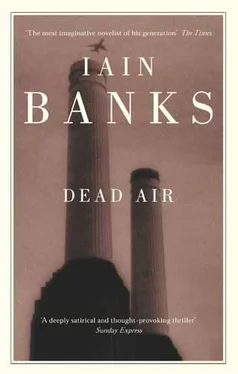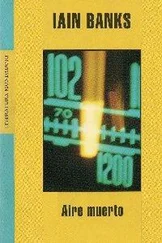Released, I curled up, gasping and mewling, bunched round the pain and the wheezing vacuum formed by the punch, and they bound me in that position before I could do anything about it, quickly and efficiently sticking silver gaffer tape over my mouth and tying my hands and ankles all together with the same plastic ties the cops use. They both wore latex gloves, like surgeons. They frisked me quickly, efficiently, taking everything out of my pockets. Then they roped my neck to the same four-way knot securing my wrists and ankles so that I was trussed into a fetal position. That way I fitted into the foam-lined metal shell of a washing machine in the big cardboard box I’d glimpsed earlier, which they must have lifted down the stairs. They lowered me into it, sitting me on my buttocks and feet, and then secured the lid, cutting out all light. I heard the cardboard flaps slap down above me and the tearing noise of more gaffer tape being applied, then I felt myself being lifted up the steps.
I was on my side now, lying on and surrounded by what felt like thick expanded polystyrene. I tried to move, tried to scream down my nose, tried to kick or punch or do anything, but all that happened was I produced a pathetic keening noise through my snotty nostrils and got myself all hot in the tiny, insulated space. I felt myself carried up the gangway, along the pontoon, up the slope to the car park, and then heard the faint noise of what sounded like a pair of van rear doors opening. I was placed down, the doors closed with a muffled thud and a few seconds later the van, engine unheard within all the foam padding around me, started off, swinging into the main road and accelerating away.
Oh God, oh fuck, oh shit. The very, very best I could hope for now was that this was still something to do with that wanker and his dangerous driving case. Mark whatever he was called. Maybe he was still trying to get away with a functioning driving licence; maybe he had persuaded my new pal Mr Glatz that, after all – and despite our little word outside the Imperial War Museum – I still needed to be leaned upon. Maybe he’d found new crim pals willing to do the job for him. Maybe he had more villainous resources of his own than Mr Glatz had credited him with. Maybe all this was just to get me utterly fucking petrified – if so; hey, mission accomplished, guys! – so I’d agree to change my witness statement.
Except I didn’t think so.
It was all so fucking easy and efficient and well thought-out, somehow. Too practised. These fuckers had done this before. It was Merrial.
But maybe not. Maybe when we got to wherever we were going – and it was always possible we were going somewhere really terminally and immediately god-awful, like a crusher or an incinerator, or just the edge of an old dock – maybe I’d see this guy Southorne, not John Merrial. Maybe.
I started to cry. The pain in my abdomen was receding now, but I started to cry.
The van swung smoothly through the city’s night-time streets, this way and that.
All the things I’ll never get to say. All the rants I’ll never get to rant. There was one shaping up about context, about blindness, about selectivity, about racism and our intense sucker-hood when it came to reacting to images and symbols, and our blank, glazed inability to accept and comprehend reality in the form of statistics.
It’s because there was a reliable-sources statistic Phil discovered the other day; that every twenty-four hours about thirty-four thousand children die in the world from the effects of poverty; from malnutrition and disease, basically. Thirty-four thousand, from a world, a world-society, that could feed and clothe and treat them all, with a workably different allocation of resources. Meanwhile, the latest estimate is that two thousand eight hundred people died in the Twin Towers, so it’s like that image, that ghastly, grey-billowing, double-barrelled fall, repeated twelve times every single fucking day; twenty-four towers, one per hour, throughout each day and night. Full of children.
We feel for the people in the towers, we agree with almost any measure to stop it ever happening again, and so we should. But for the thirty-four thousand, each day? Given our behaviour, and despite the idea we’re supposed to love our children, you could be forgiven for thinking that most of us just don’t give a damn.
So, maybe not such a terrific world to be contemplating leaving, then (a straw caught in the undertow, heading downwards into the darkness, to clutch at). At least I said I loved Ceel. I told her, in the conventional three words. That’s something. Not much, perhaps, and she never did return the sentiment, but it’s something that I got to say, maybe the last unforced thing I’ll ever say.
It seems like a long time before the van stops. Then it starts again, moving slowly. It jiggles over what feels like some roughish ground or badly pitted roadway, then angles down. One left corner, taken slowly, then a series of them, as though we’re on a spiral ramp, heading downwards. Then we stop.
It feels like my heart is thrashing against my ribcage, desperate to escape; a rat in an already humming microwave. Sweat pours off me in the tightly insulated confines of the box. Then I’m lifted, set down, and there’s the sound of tape being ripped from the cardboard above me. The lid comes off and a little light seeps in. I’m hoisted out easily by the two overalled guys who had put me into the box. They undo the rope holding my neck down to my ankles and wrists, then cut a plastic tie holding my wrists and ankles together. I’m opened out like a penknife and stand precariously between them, ankles still tied to each other and wrists the same. I’m in a big rectangular concrete tunnel. It’s quite dark, lit only by a couple of armoured glass ceiling fixtures.
The van we came in was a white Astramax and a little part of my brain that doesn’t believe all this is really happening to me thinks, Ah! Of course it’s an Astramax; what else? Ahead there are two wire mesh gates and distant ceiling lights forming a grid in a larger space beyond. The air smells dank and filthy like rain-diluted sewage; it feels cold on my sweat-beaded skin.
They drag me to the mesh gates and push them open. We’re on a slight slope. Beyond, the slope disappears into darkness black as night, the darkness of an infinite pit.
Lights come on across the black gulf. The mainbeams of a car, blinding. The blackness is water. We splash into it, raising a smell of something dead and rotten into the air. The water is only a couple of centimetres deep, barely more than a film. The toes of my shoes are dragged through the thin covering over old but still smooth concrete. About fifteen metres in from the shallow ramp we entered from, we get to the place where the car is. It’s a big, dark, modern Bentley. By its offside there is a little island of pallets; about two dozen squares of anaemic yellow-white undressed wood arranged to provide a sort of crude pontoon above the shallow sheet of dark water. The Bentley sits beside the pallet island for all the world like a liner tied up to a quayside.
In the centre of the pallets, a single metal column comes down from the roof. There are two piles of bricks on each side of the column, about sixty centimetres high, bound to the black iron column with thick black insulating tape. A metre away, facing this, there is a single big plain wooden seat, sturdy and armless, the sort of thing you might find at the head of a farmhouse table.
When I see it I try to struggle, but it’s almost comically ineffective. I suspect the two guys holding me don’t even notice. They put me in front of the seat. When I resist being sat in it the one who hit me before whacks me with one fist, crunching into my cheek. I lose it for a moment and when I’m fully aware again I’m already tied and taped into the seat and they’re just finishing taping my feet to the iron column. My heels are resting on the piles of bricks, one on either side of the metal post.
Читать дальше












